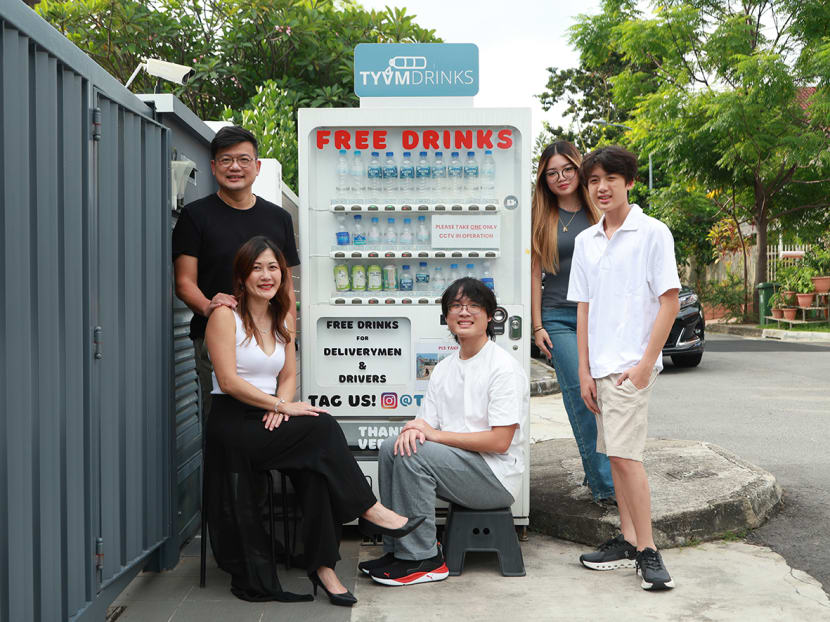The Big Read in short: Respect, kindness in short supply for food delivery riders
SINGAPORE — The uniforms of various food delivery platforms have become ubiquitous in Singapore but to Mr Choo Yi Hung, the shirt can be a badge of inconvenience.
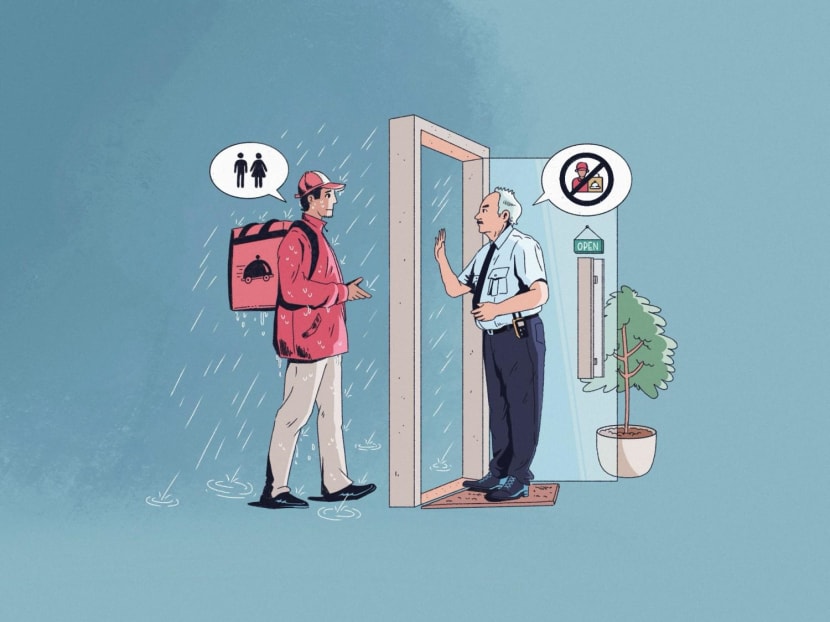
Several delivery riders TODAY spoke to say they have encountered instances where they were denied access to the toilets at certain establishments.

This audio is AI-generated.
Each week, TODAY’s long-running Big Read series delves into the trends and issues that matter. This week, we look at the challenges and indignities that food delivery riders face – and the importance of fostering greater respect for these gig workers who silently provide essential services. This is a shortened version of the full feature, which can be found here.
- Singapore’s 16,000 delivery riders are ubiquitous, yet at the same time they are an “invisible” workforce, providing essential services without much recognition or respect
- The riders are often given short shrift, having to please or accommodate many “bosses” — customers, businesses, building managements and delivery platforms
- They told TODAY of indignities they face daily, from not being allowed to use toilets at vendors’ premises to being at the receiving end of vulgarities from vexed customers
- The Platform Workers Bill, tabled in Parliament on Aug 6, promises significant improvements in union representation and legal protections for gig workers, if passed
- Still, riders, customers and experts say fostering a broader culture of kindness is the more essential solution
SINGAPORE — The uniforms of various food delivery platforms have become ubiquitous in Singapore but to Mr Choo Yi Hung, the shirt can be a badge of inconvenience.
Mr Choo, 30, who has been a delivery rider for six years, initially wore the uniform but stopped, partly because he felt he was treated differently whenever he donned it.
“Every single rider I know (delivering) in my area – CBD – very few of us choose to wear the uniform. It singles you out,” he said, referring to the Central Business District.
Agreeing, Mr Peter Yeo, 52, a food delivery rider for seven years, recalled an incident during one of his rounds, where he was asked by a condominium resident to take the next lift as it got increasingly crowded – even though Mr Yeo had been the first person in line at the lift lobby.
“Sometimes, when we wear our uniform… some of the residents think that we should give them priority to use the lift,” said Mr Yeo.
“It’s discrimination. Sometimes I feel very pissed off; they shouldn’t have that kind of mentality. Everyone is equal, regardless of how rich you are, what your education level is. We are only trying to earn a living.”
These frustrations only scratch the surface of the indignities that food delivery riders face daily.
Mr Yeo said that between 30 and 40 per cent of food and beverage (F&B) businesses he has encountered do not allow riders to use their toilets, saying they are meant only for customers.
Several riders told TODAY that some condominiums also do not allow riders to ride their electric bicycles into the building’s car park, or to park their vehicles within its compound.
A 36-year-old rider, who declined to be named, said: “We are only allowed to walk in. I once delivered 12 bottles of 1.5-litres water to a condo. I think I walked almost 500 metres to reach the customer’s unit. When I was there, my whole shirt was soaked in sweat and my legs wobbled.”
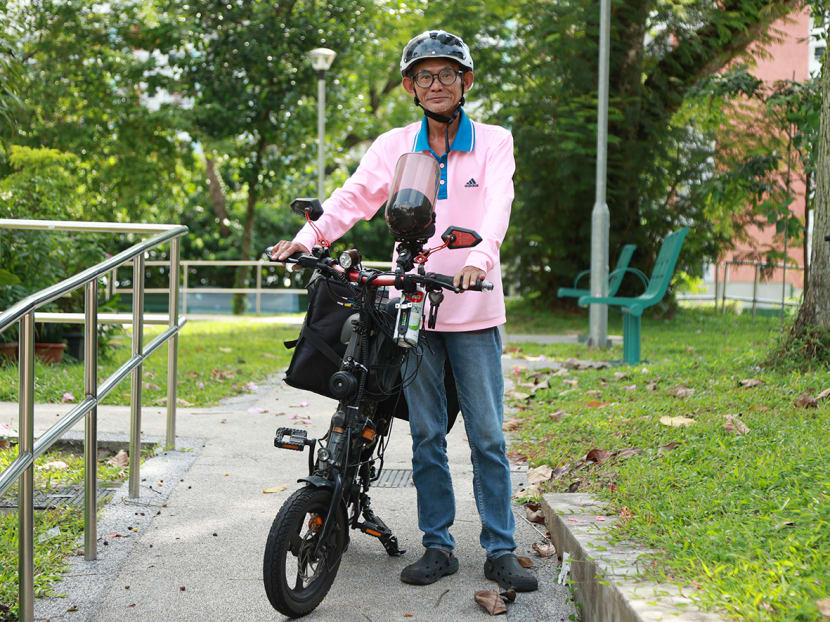
Riders also often find themselves at the receiving end of angry customers, including over issues that are beyond their control. These include delayed deliveries due to long wait times at the F&B vendors, or adverse weather and traffic conditions.
Even when using supposedly shared public spaces, such as pavements and roads, some riders are left feeling like second-rate citizens.
Mr Mohamed Norfirdaus, 42, noted that many pedestrians have the habit of walking with their earphones plugged in, while looking down at their phones.
“So when we ring the bell, when we honk, we say ‘excuse me’, they are not aware.”
Left with no choice but to move his vehicle around the person in such cases, Mr Norfirdaus said: “Then they will get shocked, they will start to make noise and hurl vulgarities. But the fact is, we are not at fault.”
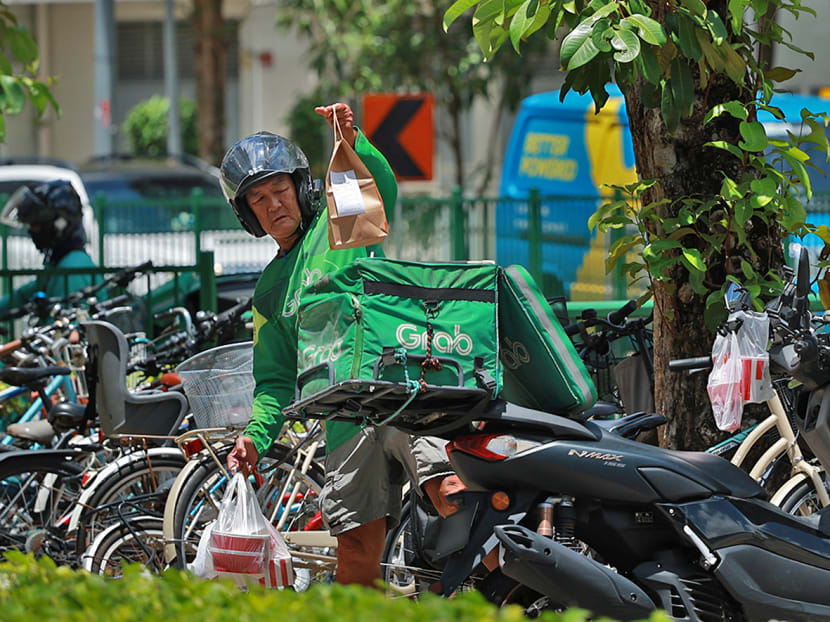
WHY IT MATTERS
While they form a sizable segment of the service sector here, Singapore’s 16,000 delivery riders are often given short shrift, having to please or accommodate many “bosses” — customers, businesses, building managements and delivery platforms.
Ms Michelle Tay, director of programmes and operations at Singapore Kindness Movement (SKM), said: “The overarching perception of service workers, including delivery riders, in Singapore, is that they often remain in the background, silently providing essential services without recognition.
“They are almost ‘invisible’, especially with ‘leave at the door’ options which many started to gravitate to with the onset of Covid-19,” she said.
Agreeing, Mr Yip Hon Weng, Member of Parliament (MP) for Yio Chu Kang Single Member Constituency (SMC), said: “Riders are often seen but not heard. Their work, while visible, does not always garner the empathy or understanding that more traditional professions might receive.
“The nature of platform work, where riders are often treated as independent contractors, can also lead to a perception that they are more expendable or less deserving of traditional worker rights and respect,” said Mr Yip, who is also a member of the Manpower Government Parliamentary Committee.
As riders do not have a fixed work environment, they often find themselves at the mercy of vendors and building managers. For example, in the absence of proper holding areas and resting places, riders sometimes have to wait in the hot sun or rain for orders to be prepared.
In cases where they are restricted from using the business’ or building’s toilets, riders also have to look for malls and petrol kiosks with restrooms which they can use.
Aside from the lack of spaces, some riders said they also have to put up with the unpredictable behaviour of service staff at the F&B outlets, from being ignored by them to having to bear with the agitation and unhappiness of harried employees.
Mr Norfirdaus added: “Sometimes due to high demand, when they receive a lot of orders, some (staff) tend to vent out their frustration – especially to us riders. Because we are not working under their management, the next ‘best’ group of people that they can vent out on is the riders.”
Riders get paid per order, so their income is dependent on their ability to fulfil these orders. But this can be impeded by businesses that may accept more orders than they can handle, leading to very long wait times.
A system overload at the F&B end can thus have a domino effect on the food delivery riders. They told TODAY that it is common for customers to press them for a speedy delivery when the order is “stuck” at the F&B outlet – and then show their displeasure at the riders when the order arrives late.
Mr Wong Yao Hui, 56, recalled an incident where he had to wait an hour for a vendor to prepare the customer’s order. Just as he picked up the order, the customer cancelled it.
“It’s not my fault. But they take out their anger on the riders,” said Mr Wong.
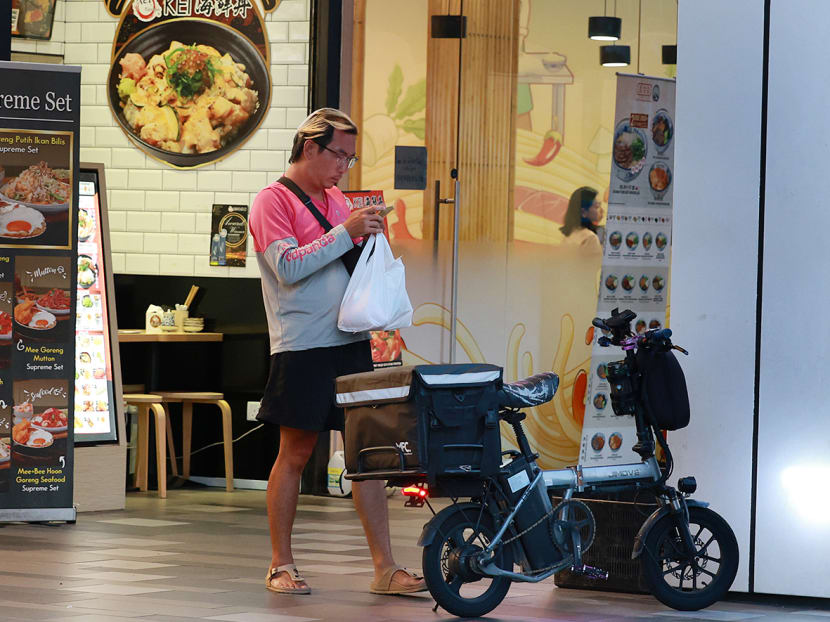
THE BIG PICTURE
With food delivery riders often caught between F&B outlets and customers, they may find themselves at the losing end when disputes happen.
Mr Choo, the rider, said: “I feel like people do not respect us because we do not have a way to collectively come together to assert our demands and to make our presence in this society known.”
Hence, some riders and experts believe that formal union representation – one of the provisions in a new Platform Worker Bill – could improve their standing in more ways than one.
The Bill, tabled in Parliament on Aug 6, proposes measures to support the housing and retirement adequacy of platform workers. If passed, it would make provisions for work injury compensation, and strengthen the responsibilities of platform operators and workers to prevent injuries.
The Bill also calls for creating a legal framework for the representation of platform workers, which would go a long way in advocating for their rights.
Currently, riders receive support from the NDCA, which functions as an association under NTUC to protect delivery riders.
Still, without formal representation, delivery platforms may choose not to talk to the association, said Ms Yeo Wan Ling, assistant secretary-general of the National Trades Union Congress (NTUC) and adviser to the National Delivery Champions Association (NDCA).
“With formal representation… it’s in Singapore’s laws. It’s not just leverage… (but) the platform companies need to respond to the unions and the associations when they put out certain requests. That’s the powerful part of it.”
Food delivery platforms Grab, Foodpanda and Deliveroo, tell TODAY that they have systems in place to support riders who face extended waits at F&B merchants.
For example, Grab said merchants can activate the feature in its app to pause online orders temporarily during peak periods, to prevent orders from building up.
In the event that wait time is longer than expected, riders can also contact Grab, and the platform would compensate them accordingly.
Deliveroo, which has 6,000 riders in Singapore, said its riders have the flexibility to decline orders when necessary without penalty, and exceptionally long waiting times may be considered when making this decision.
A Foodpanda spokesperson said that if further assistance is required, riders can also inform its support team and request for another rider to be dispatched to deliver the order instead.
When it comes to handling disputes, delivery platforms say they aim to be fair to all stakeholders, and will evaluate all available information to resolve an issue.
The Foodpanda spokesperson told TODAY that the platform “thoroughly investigates” every issue, taking into account data points and feedback from all parties, before assessing and taking the appropriate action.
Grab’s spokesperson said it “carefully evaluates” consumers’, riders’, and merchants’ feedback to determine if it is valid, and look at multiple sources to “determine which party may be at fault, to the best of our ability”.
“This includes consumers’ refund histories, merchant- and delivery-partners’ ratings and reviews, GPS data, photo evidence, and more. While this may not always be fool-proof, we do our best to evaluate the situation and provide support accordingly.”
The platforms say they also organise various initiatives and events to show appreciation to their riders.
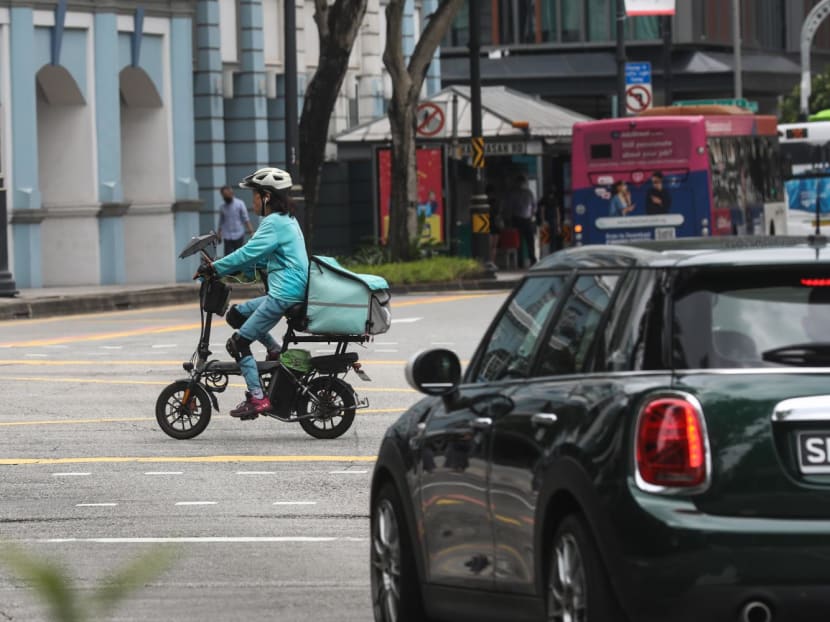
THE BOTTOMLINE
While Singapore still has some way to go in cultivating respect and compassion for its invisible workers, there are rays of hope.
Although they have had their share of unpleasant experiences, most of the riders interviewed said most of their interactions with customers and businesses are uneventful and they have also encountered some heartwarming moments.
Some Singaporeans have gone a step further to promote this culture of kindness, such as general practitioner Lisa Chen.
Dr Chen’s family set up a vending machine – offering free beverages to delivery riders and taxi drivers – outside their home in Yarrow Gardens, Siglap in January last year.
The 52-year-old told TODAY that it is the family’s way of showing their appreciation for the hard work and dedication of delivery riders and drivers. The family of five also shares about the initiative on an Instagram page, under the handle “TYVMdrinks”.
“We hope that by showcasing our efforts, we can inspire others to think about ways they can support and show kindness to delivery riders and service staff,” said Dr Chen.
Ultimately, the initiative is just one expression of gratitude and support for delivery riders and service staff.
Dr Chen added: “We hope that our initiative can inspire others to find ways to contribute to their well-being and help build a culture of mutual respect and appreciation.
“When society values and appreciates these workers, it promotes better working conditions, encourages higher job satisfaction and builds a stronger community overall.”
